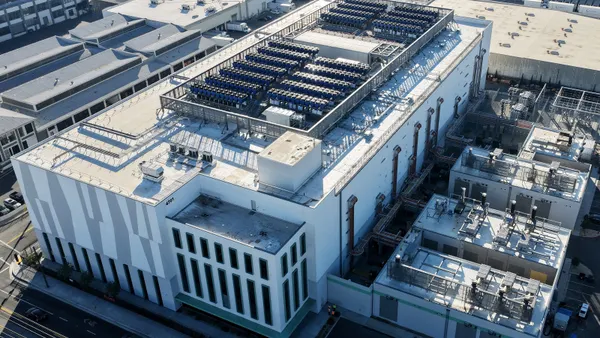Aaron Daly has spent his career at the intersection of the energy and food industries. At Whole Foods Market, Daly was the global director of energy management, where he was responsible for the grocer's energy efficiency and energy-procurement initiatives, which included overseeing on-site renewable-energy installations and other sustainability initiatives. Before joining Whole Foods, Daly worked at PECI, a nonprofit consulting group, where he helped food retailers, such as SuperValu, Albertsons and Trader Joe's, bolster their energy efficiency.
Daly's experience ultimately motivated him and a group of colleagues to found the Ratio Institute in 2020 to help address what he saw as a big energy-related challenge and opportunity facing food retailers. "We started to see a real uptick in the need for corporate action on sustainability," said Daly, a principal at the Santa Cruz, California-based nonprofit organization. "At the same time, we also saw that the food retail industry was not in a strong position to be able to respond to that need, given their strong focus on food safety, low profit margins and being naturally very cautious about adopting technology."
How a changed mindset about energy unlocks opportunity
The Ratio Institute seeks to fill that void by providing the independent, third-party knowledge and consulting services necessary to help food retailers accelerate progress toward their decarbonization and sustainability targets — and to do so in ways that don't imperil their core business of selling food.
While wariness about change is a common challenge, the truth is that food retailers are uniquely positioned to take steps that simultaneously deliver financial benefits, move them more quickly toward their sustainability goals and also provide critical flexibility and support to a changing power grid. The key to achieving these goals is for grocers to start thinking of their commercial buildings as financial assets that can be managed and optimized through energy efficiency and smart energy use.
In part, this process begins with food retailers understanding that their monthly utility bill is not just a fixed cost set in stone. Instead, grocers, particularly those with multiple large buildings, need to understand that they can make operational and investment choices that lower their bills while also taking advantage of utility programs and incentives that reward flexibility.
Indeed, Patty Cook, senior vice president, market development, for consultancy ICF works with utilities around North America that are focused on evolving their demand-side management programs to help manage a cleaner and more distributed grid through flexibility. In that regard, Cook said, supermarkets with large and potentially controllable loads make them especially valuable to utilities — but it requires an evolution away from the way demand-response programs have been run in the past.
"The traditional demand response has basically been asking a large energy user to stop using or to reduce using power for a certain period of time. And that's never a good thing for someone who runs a business," said Cook. "Flexible demand management is a little bit different from that because it's an ongoing adjustment of load using technology and a collection of buildings that have different load shapes and consumption profiles."
It's understandable why utilities would be eager to tap the large and flexible loads of food retailers as the grid incorporates more and more distributed energy resources. "Not only are food retailers massive consumers of electric power, their buildings are distributed because they are intentionally positioned right in the middle of residential communities," Daly said. "The potential to modernize and utilize the footprint of food retailers to supply value to the grid is enormous, and the technologies exist to do it."
Improved technologies and improved understanding
Empowering food retailers to manage their energy use in ways that lower their monthly bills and even earn additional revenue by participating in demand-response programs involves a journey that is familiar. Food retailers routinely look for equipment upgrades and retrofits that can lower operating costs while improving control over the temperature and condition of their products.
In his work with supermarkets and other food retailers, James Jackson, director of utility and energy programs at Emerson Commercial & Residential Solutions, starts with an informal energy audit of their facilities. "It's just walking around the facility with a customer and saying have you looked at these lights and equipment? When was the last time you replaced this?" Jackson said. "It's about learning about their day-to-day practices, and providing education about control systems and how other technologies can improve efficiency and elevate the flexibility needed to take advantage of utility programs."
Part of the education is about advances in controls technologies that help food retailers take advantage of potential new revenue streams. But it's also about clearly seeing the benefits of embracing their role in decarbonization and the increasingly customer-dependent grid. "There are all sorts of technologies that allow for buildings themselves to be managed better. What you want to do is collect all of those buildings together and manage them as a collective unit," Cook said. "When you manage those resources collectively to meet a grid need, the financial and environmental benefits for customers and the grid can be big. I think we are on the precipice of that."
One challenge that needs to be met, though, is improving understanding and connections between food retailers and utilities. This is particularly important because utility programs and priorities vary widely from company to company and region to region. Bolstering those mutually beneficial connections is a role Emerson embraces. "Food retailers don't have time to learn all of these programs. They need somebody who understands the programs and has dealt with the programs to help steer the ship so they don't have to worry about it," said Corey Wheat, business development manager with Emerson. "We are here to help no matter what your driver is, whether it's keeping your food fresh, generating a little profit with demand response or participating in energy markets. We have the technology and partnerships to help with that."









